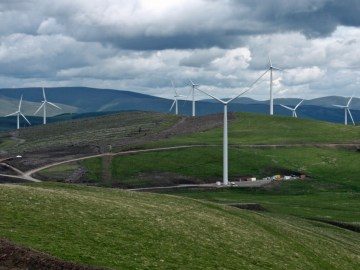Microsoft and professional services company Accenture have unveiled a five-point plan that aims to speed up the UK’s mission to achieve net-zero carbon emissions by 2050.
In conjunction with their joint venture, Avanade, Microsoft and Accenture will work together to help utility and energy companies transform the energy system and lower the cost of decarbonising the supply and demand of electricity in the UK. This will be underpinned by open data, artificial intelligence (AI) and a workforce equipped with digital skills.
The UK is the first G7 country to legislate for a net-zero target for carbon emissions by 2050. Microsoft, Accenture and Avanade will bring together their expertise in cloud, data, AI, internet of things, digital twins and digital transformation to help utility and energy companies support the UK’s low-carbon ambition.
SSE Renewables, a leading developer and operator of renewable energy across the UK and Ireland, is working with the companies to apply technology to reimagine its operations. Analytics, AI and data visualization capabilities are being deployed on Microsoft Azure for scalability and speed, empowering the company to generate actionable operational and commercial insights from diverse data sets.
This helps SSE Renewables to be more cost effective and increase the reliability and life of its renewable generation assets. The company is also using AI to ensure wildlife is not adversely affected by its new windfarms.
Rachel McEwen, Chief Sustainability Officer at SSE Renewables, said: “The scale of the net zero challenge is so great and the significance of achieving it so important, we need all-hands-on-deck. The energy system – electricity in particular – must be completely decarbonised very quickly, so that trickier sectors like heat and transport can reach zero carbon emissions.
“The answer to all the technological, market and regulatory challenges that result cannot possibly come from a single organisation or sector. Partnerships, like the one between Microsoft and Accenture, are essential in bringing together an electricity utility like SSE with business and digital technology transformation specialists.”
The integrated approach to UK decarbonisation focuses on the following goals:
- Help utility and energy businesses decarbonise the supply of energy by reducing the cost of renewable generation by up to 25% and increasing its role in system balancing – managing fluctuations in the production of electricity – while ensuring nuclear plays its role effectively as a continuous supplier of base load electricity. The lifetime costs of offshore assets can be reduced, for example, by implementing remote inspection using drones and AI
- Support the cost-effective electrification of energy demand. This includes enabling 50% of the new electricity demand for transportation and heating to contribute to balancing a system where more than 70% of the power generated is from renewable sources
- Efficiently match supply and demand for an electricity system that is zero-carbon by 2025 and help businesses realise a 20% reduction in the cost of meeting increasing electricity demand through innovative approaches to network design, construction and operation – for instance, by creating digital twins of physical assets.
These efforts will be supported through the use of open industry data to provide secure, consistent and accessible information that will drive efficiency, support cross-industry innovation around new markets and improve asset performance and optimisation. The plan will also help businesses digitally enable their workforces by harnessing the power and collective intelligence of diverse teams. Connected workers, for instance, could access support remotely, resulting in higher task completion rates, improved productivity and enhanced safety in the field.
Toby Siddall, a managing director and lead for Accenture’s Resources business in the UK and Ireland, said: “The UK’s targets for net-zero push focus onto the energy and utilities sectors, through which the most significant impacts on decarbonization can be made. The time for action is now, and it will require innovative new approaches, solutions and ecosystems. Our integrated approach to decarbonisation stems from a mutual belief that data and digital transformation are essential in enabling the transition to a low-carbon future, and it can lead to growth, new skills and competitiveness for the UK. We believe it is a perfect focus for this collaboration between Accenture, Avanade and Microsoft, which can help drive the step changes needed.”
Clare Barclay, CEO at Microsoft UK, said: “Last year Microsoft announced we would be carbon negative by 2030 and remove our entire carbon footprint by 2050. A fundamental way in which we aim to achieve these targets is through technological innovation. Likewise, we pledged to develop and deploy digital technologies to help others reduce their carbon footprints. As part of our commitment to creating a greener and sustainable world, we are proud to partner with Accenture and Avanade to deploy technologies to help UK-based utility companies transform the generation, storage and supply of clean energy.”

